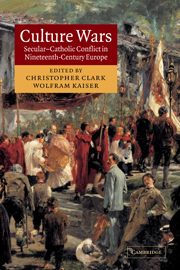Book contents
- Frontmatter
- Contents
- List of illustrations
- List of contributors
- Introduction: The European culture wars
- 1 The New Catholicism and the European culture wars
- 2 ‘Clericalism – that is our enemy!’: European anticlericalism and the culture wars
- 3 ‘Priest hits girl’: on the front line in the ‘war of the two Frances’
- 4 The battle for monasteries, cemeteries and schools: Belgium
- 5 Contested rituals and the battle for public space: the Netherlands
- 6 Nonconformity, clericalism and ‘Englishness’: the United Kingdom
- 7 The assault on the city of the Levites: Spain
- 8 Roma o morte: culture wars in Italy
- 9 Enemies at the gate: the Moabit Klostersturm and the Kulturkampf: Germany
- 10 Village quarrels and national controversies: Switzerland
- 11 The Counter-Reformation's last stand: Austria
- 12 The uncivil origins of civil marriage: Hungary
- Annotated bibliography
- Index
6 - Nonconformity, clericalism and ‘Englishness’: the United Kingdom
Published online by Cambridge University Press: 23 July 2009
- Frontmatter
- Contents
- List of illustrations
- List of contributors
- Introduction: The European culture wars
- 1 The New Catholicism and the European culture wars
- 2 ‘Clericalism – that is our enemy!’: European anticlericalism and the culture wars
- 3 ‘Priest hits girl’: on the front line in the ‘war of the two Frances’
- 4 The battle for monasteries, cemeteries and schools: Belgium
- 5 Contested rituals and the battle for public space: the Netherlands
- 6 Nonconformity, clericalism and ‘Englishness’: the United Kingdom
- 7 The assault on the city of the Levites: Spain
- 8 Roma o morte: culture wars in Italy
- 9 Enemies at the gate: the Moabit Klostersturm and the Kulturkampf: Germany
- 10 Village quarrels and national controversies: Switzerland
- 11 The Counter-Reformation's last stand: Austria
- 12 The uncivil origins of civil marriage: Hungary
- Annotated bibliography
- Index
Summary
This chapter focuses on the conflict about the attitude that the British state should take to religious education and to church establishments, particularly between 1870 and 1874 – the point in the nineteenth century at which both debates became most contentious. In 1872 a large conference of Protestant nonconformists at Manchester declared in favour of the principle of restricting the educational syllabus in state-funded schools to secular subjects. Between 1871 and 1873 the campaign by the Liberation Society for the disestablishment of the church of England reached a new intensity and prompted the only significant motions for English disestablishment ever discussed in the House of Commons. This movement has sometimes been called the ‘nonconformist revolt’. According to this view, it was a revolt by nonconformists – who were overwhelmingly Liberal Party supporters – against the Liberal government of the day, for betraying their principles. But though there is some truth in this view, this chapter argues that it is more helpful to see it in a number of other lights. It was, firstly, an attack on local clerical influence: nonconformists had an innate suspicion of the Anglican priesthood's ambitions to sway the individual religious conscience. Secondly, this led nonconformists to mobilise against the political consequences of that clerical influence, and so their campaign became a political one, part of a partisan Liberal struggle against the Conservative Party. Thirdly, it was a response to a powerful Catholic challenge – a response that was vehement but self-consciously patriotic and constitutional.
- Type
- Chapter
- Information
- Culture WarsSecular-Catholic Conflict in Nineteenth-Century Europe, pp. 152 - 180Publisher: Cambridge University PressPrint publication year: 2003
- 1
- Cited by



